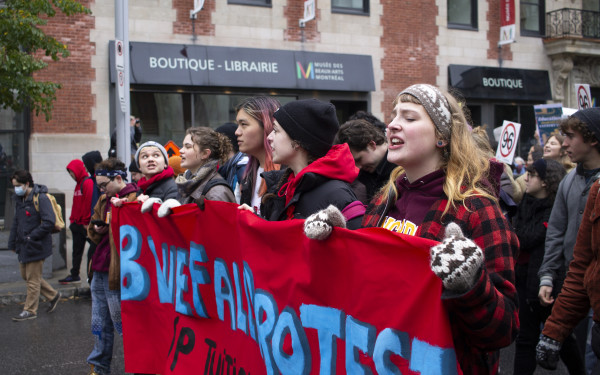Who is Bill 96 actually for?
Francophones are the majority in Quebec, but a minority in Canada, creating a unique cultural duality. This affects non-francophones in the province in many different ways, Bill 96 being one of them. Graphic Joey Bruce
New French language legislation disappoints politicians and students alike
“Solid, necessary, and reasonable.”
This is how, last May, Premier François Legault announced Bill 96, a new set of comprehensive reforms designed to reinforce French in the province.
Although lauded by many francophones, it also attracted considerable controversy.
Legault notably invoked the notwithstanding clause, permitting provincial governments to override certain charter rights to pass legislation. The same clause was used to pass Bill 21, the notorious provision preventing state employees from wearing religious garb while working.
Across Canada, many have questioned the bill’s constitutionality, and whether it might set a dangerous precedent for provinces acting without federal approval.
Locally, people are concerned about the bill’s changes to the CEGEP system.
Currently, 17.5 per cent of the student population attends an English-speaking CEGEP. If the bill passes, this percentage would be frozen indefinitely. But, if it decreased, the lowered rate would then become the new cap. This means the share of students in English-speaking institutions could only stagnate or falter.
Anglophone student population growth would also be limited to 8.7 per cent a year, a 2005 number collected from a Ministère de l’Éducation, du Loisir et du Sport report.
As students graduate high school and join the eligible student population, Bill 96 would ensure that only 8.7 per cent of them could attend an English CEGEP.
These students already belong to a restricted category. In Quebec, every student must attend public school in French unless they or a close relative have previously received a major part of their elementary studies in English in Canada. However, those who were eligible when the law was adopted can pass that eligibility down to their children. Those willing and able to pay for private schools can also bypass these restrictions.
Since Bill 101 enshrined French supremacy into law in 1977, the percentage of kids in English schools has been halved.
A 2016 thesis by Concordia educational studies graduate, Jennifer Ryan, "The Burden of Choice: Deciding Between English and French Education in Quebec", focuses on this shift.
She found that, of all students eligible for English elementary and secondary education, both anglophone and francophone, “9 out of 10 opt, on average, to enrol in English school.”
In a joint response to the bill, Montreal’s three anglophone CEGEPs stated they "will not address the ongoing desire among many young Quebecers to attend our institutions.
“In a public college education system, there’s an assumption that there’s a freedom of choice. You would think that there would be no issue with francophone students being attracted to anglophone institutions.” — Alexandrah Cardona
Bulmaro Bermudez, a Dawson graduate now working as a video editor, attended French school but learned English from his brothers. He recalled making the switch as a career move. “The career that I want is in cinema. The industry in English is simply bigger than it is in French, or any other language really. I wanted more doors to be open to me.”
According to Alexandrah Cardona, president of the Dawson Student Union, “In a public college education system, there’s an assumption that there’s a freedom of choice. You would think that there would be no issue with francophone students being attracted to anglophone institutions.”
Concerns have grown about English CEGEPs becoming more exclusive. “Our acceptance rate for some programs is [about 20 per cent], which is on par with some of the top colleges and universities in the US, and Dawson is supposed to be a public college,” said Cardona.
The pandemic has also made admissions to anglophone CEGEPs more competitive. As students fail classes or take on more manageable course loads, the pandemic has slowed down the turnover that would usually make space for newcomers.
This had led some expelled students to believe their expulsions were rushed and unfair. One ex-Dawson student, who requested anonymity, alleged that they and others were expelled abruptly without meeting expulsion criteria. “A lot of the people I know were in their last semester [and] getting expelled,” they said, specifying that none of them received any warning that their academic track was in peril. According to Cardona, the accusations are apocryphal.
Recently, Dawson also received $100 million from Legault’s government, meant to accommodate the growing student population by expanding the campus. Meanwhile, no other CEGEP has received a comparable subsidy.
Bernard Tremblay, head of the Fédération des cégeps, hopes the bill will lead to “social peace.” On the subject of how the bill would benefit francophone students, he said it would allow “students to realize that they need to take care of their higher education establishments.”
For many, Quebec’s cultural future is yet again in limbo. Notably, Parti Québécois members Louise Beaudoin and Louise Harel chastised the bill’s moderate stance on enforcing French.
In their brief presented during the bill’s consultations, the pair indicate respect for Quebec’s multiculturalism, but believe it must occur under the umbrella of the French language.
"The 1977 French language charter had, among others, the goal of ‘de-ethnicizing’ French, and making it the public language of all Quebec citizens, with obvious exception to Native Americans and the historic anglophone minority," the brief stated.
Their goal is for French to operate as a lingua franca, connecting the contrasting elements of Quebec’s cultural diversity. “Bill 101 is a bill that was and remains a bill for everyone,” they added.
“This will without a doubt be a piece of legislation that, just like Bill 21, confirms the highly nationalist and identity-oriented character of the CAQ government.” — Jocelyne Richer
The extension of Bill 101 to CEGEPs, as discussed by the Parti Québécois, would altogether bar access to English CEGEPs to any student from the francophone system. "The reason we agree with Bill 96 is that it doesn't apply Bill 101 to CEGEPs," said Tremblay.
Legault anticipated controversy. “Some people will say it doesn’t go far enough. Others will say it goes too far. I think that’s proof that our bill is reasonable.”
According to a Quebec Community Group Networks poll, a considerable majority of anglophone and allophone Quebecers oppose the bill. Francophone respondents were more divided, with roughly 60 per cent in favor. However, all three groups agreed that one demographic, Quebecers speaking neither English or French as a first language, would be the most affected by the bill’s changes.
More than half of allophones attend CEGEP in English, but most start off in the French system, per the province’s regulations.
“This will without a doubt be a piece of legislation that, just like Bill 21, confirms the highly nationalist and identity-oriented character of the CAQ government,” writes Jocelyne Richer, of the Canadian Press.
When it comes to living and studying in Quebec, the government has, through numerous linguistic policies, made clear who is a priority and who isn’t.
According to a 2016 report by Statistics Canada, about a quarter of Montreal’s population is made up of first-generation immigrants. Most come from francophone countries, such as Haiti, France, or the Maghreb, but many, such as Chinese, Latin-American, or Levantine migrants, among others, arrive with little to no French education.
Currently, the government offers a francization program to facilitate integration. Courses are free and often occur at CEGEPs. “The student is in an environment where they can fully immerse themselves in French, where they can be around young people speaking French,” said Tremblay.
However, immigrants who only have experience with English tend to choose a different path.
Toronto’s migrant population is twice the proportion of Montreal’s, as it welcomes more people from countries where English is taught as a second language, like China, India, or the Philippines.
“The choice that [immigrants] make in coming to Quebec is to adhere to our goal of making French the common language,” said Tremblay, later specifying that it “doesn’t mean we’re preventing them from speaking English.”
Because of their historical status in the province, anglophones are afforded special protections in order to continue speaking the language they feel most comfortable with. The government, however, feels no need to preserve the linguistic continuity of allophone Quebecers.
“[The anglophone community] has to contend with a feeling of insecurity from the francophone majority. Seven million francophones in a sea of anglophones; it’s time to bury the debate.” said Tremblay.
Although a minority in North America, francophones in Quebec comprise 77 per cent of the local population, while anglophones and allophones represent about 20, mostly concentrated in Montreal.
“This idea of protecting the French language feels really colonialist. [...] It’s such a weird fear of the other. I feel like it’s not from a genuine intention of preserving the French language; it just feels like nationalism,” said Daylen Conserve, a Montreal-based graphic designer and Dawson graduate.
Most international CEGEP students attend French-language institutions outside of Quebec’s large cities. Tremblay believes that “once integrated, after their schooling, [we’d like them] to stay in Quebec and become recognized immigrants. It’s a great strength that we need to highlight.”
However, a Montréal Internationale study shows that, relative to Ontario or British-Columbia, few international students remain in the province after graduation. Quebec also grants fewer work permits than the other two provinces, prompting questions about whether the issue is linguistic or cultural
“There was a time in recent years when François Legault and his government were on board—or at least weren’t against—the operations or even the expansion of anglophone colleges. And then, as political pressure mounted from his constituency, we see him rush out a bill.” — Alexandrah Cardona
For Beaudoin and Harel, there’s a disconnect. “The language may be common—96% of Quebecers claim to be conversational in French—but that doesn’t mean the culture is.”
“Nothing in this bill aims to remedy this gap between francization and the Québécois culture. There’s a missing piece,” they wrote in their brief.
Cardona and Tremblay feel blaming English CEGEPs is a nonstarter. “We haven’t necessarily seen evidence that [francophone students] stay [in the English system] when it comes to university or in the workforce. There might be this assumption that secondary students are trying to escape the francophone school system, but that’s not necessarily true," said Cardona.
According to a doctoral thesis by Karine Vieux-Fort, who spoke to 37 francophones having entered the English system after high school, “French linguistic identity is independently maintained despite English collegial studies and whether or not English is present in any aspect of their lives.”
Vieux-Fort added that francophones who attend an English CEGEP go on to switch between languages in their professional and personal lives, suggesting their choice of school doesn’t threaten their mother tongue.
“It’s a little bit complex as to why francophone students on average tend to be gravitating towards English speaking institutions,” said Cardona. “Rather than just applying the band-aid solution that is Bill 96, we’re asking that the government formally investigate that."
However, the government will find what researchers already know: bilingualism is important in Quebec, but speaking English is important outside of it.
English CEGEPs are reporting higher attendance, while their French-language counterparts have reported a two per cent decline over the past 25 years.
“I think that Bill 96 was reactionary,” said Cardona. “There was a time in recent years when François Legault and his government were on board—or at least weren’t against—the operations or even the expansion of anglophone colleges. And then, as political pressure mounted from his constituency, we see him rush out a bill.”
Whether it was adding French courses to the curriculum or allowing students to submit work in French, Cardona thinks anglophone students were more than willing to consider alternative solutions, but their efforts were sidestepped.
“If we want students to choose to study in French,they need to want to do so,” said Tremblay. Our French-language establishments need to be more attractive.”
“We need to use our CEGEPs as places to spread our culture, not repress others.”




